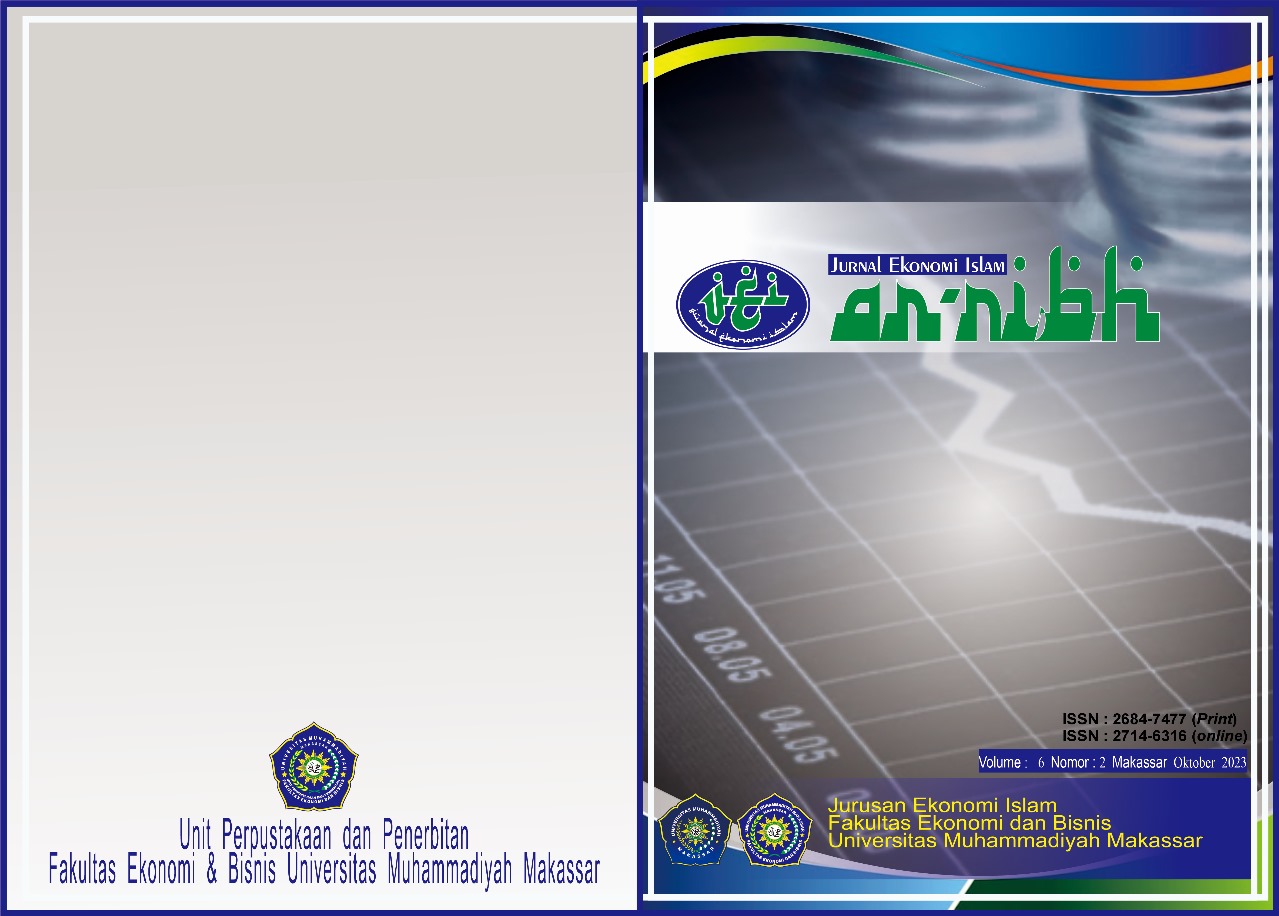Institutional Framework and Regulatory Challenges in the Development of the Sharia Financial Sector in Indonesia: A Political Economy Perspective
DOI:
https://doi.org/10.26618/jei.v6i2.12812Abstract
This study aims to examine the institutional framework and regulatory challenges in the development of the Sharia financial sector in Indonesia.The main objectives of this research are to analyze the role of government institutions and regulatory bodies, as well as to identify regulatory barriers, in order to strengthen the institutional framework and support the growth of the Sharia financial sector in Indonesia.This study utilizes qualitative research to analyze the institutional framework and regulatory challenges in Indonesia's Sharia financial sector from a political economy perspective. Data will be gathered from policy documents, legal regulations, government reports, academic publications, case studies, and expert interviews. The analysis will involve content analysis for policy documents and regulations, interview analysis, and descriptive analysis of statistical data on the sector's growth.Overall, the results of the analysis show that through this active participation, the Indonesian government hopes to strengthen Indonesia's image as the global financial center of Shariah and the country's economic position at the international level. Thus, the role of the Indonesian government in the Sharia financial sector is expected to continue to grow, provide greater benefits to Indonesians, and strengthen Indonesia's position at the international level. Increased intensive collaboration between governments, practitioners, and colleges in the form of development programs to produce competent human resources (HRM) finance. Providing stronger policy incentives and support The government needs to provide stronger incentives and policy support to develop Sharia finance in Indonesia. Encourage the development of innovative Sharia financial products.References
Durand, C., & Keucheyan, R. (2015). Financial hegemony and the unachieved European state. In Competition and Change (Vol. 19, Issue 2, pp. 129–144). https://doi.org/10.1177/1024529415571870
Ferguson, N. (2010). The Ascent of Money: A Financial History of the World - By Niall Ferguson. Historian , 72 (4), 998–999. http://doi.wiley.com/10.1002/ajpa.1330400221nhttp://doi.wiley.com/10.1111/j.1540-6563.2010.00281_70.x
Fikriyah, K., & Yudha Alam, W. (2021). The Development of Sharia Finance in Political Reality in Indonesia. Scientific Journal of Islamic Economics , 7 (03), 1594–1601. http://jurnal.stie-aas.ac.id/index.php/jiedoi:http://dx.doi.org/10.29040/jiei.v7i3.2687
Frank, A.G. (2018). The development of underdevelopment. In Promise of Development: Theories of Change in Latin America (pp. 111–123). https://doi.org/10.4324/9780429497995
Hall, P. y Taylor, R. (1996). Political Science and the Three New Institutionalisms Peter A . Hall and Rosemary C . R . Taylor. Political Studies , XLIV , 936–957.
Huda, M.C. (2020). Relations between Islam and the State (Political Legal Studies in Indonesia). Pax Humana , 155–172. http://jurnalilmiah-paxhumana.org/index.php/PH/article/view/218
Irawan, M. (2018). THE POLITICS OF SHARIA ECONOMIC LAW IN THE DEVELOPMENT OF SHARIA FINANCIAL INSTITUTIONS IN INDONESIA. Legal Media Journal , 25 (1). https://doi.org/10.18196/jmh.2018.0097.10-21
Islamic finance development report. (2021). Islamic finance development report 2021: Advancing economies. In Refinitiv: An LSEG Business . https://www.refinitiv.com/content/dam/marketing/en_us/documents/gated/reports/report-2021-all-color2.pdf
Kaminsky, G.L., & Reinhart, C. (2013). The Center and the Periphery: The Globalization of Financial Turmoil. In Money, Crises, and Transition (pp. 171–216). https://doi.org/10.7551/mitpress/9780262182669.003.0009
Finance, O. J. (2021). Indonesian Sharia Banking Snapshot 2021. Financial Services Authority , 1–7.
KNKS. (2018). Indonesian Sharia Economic Masterplan 2019-2024. Ministry of National Development Planning/National Development Planning Agency , 1–443. https://knks.go.id/storage/upload/1573459280-Masterplan Eksyar_Preview.pdf
Komariah, DS & A. (2017). Qualitative Research Methodology. Bandung: Alvabeta , 3 , 22.
Latifah, NA, & Nugroho, SA (2020). Optimizing the structure and regulations of Islamic financial institutions in Indonesia. Journal of Sharia Economics , 07 (01), 176–211. http://ejournal.iain-tulungagung.ac.id/index.php/nisbah/article/view/2366
Levine, R. (2004). Finance and Growth: The Theory and Evidence. NBER Working Paper 10766 , September , 0–117. https://www.nber.org/papers/w10766
Maxwell, K., Cardoso, F.H., & Faletto, E. (1997). Dependency and Development in Latin America. Foreign Affairs , 76 (5), 229. https://doi.org/10.2307/20048243
Moh. Nazir. (2014). Research methods. Research Methods , 486.
Mua, U. (2022). The Existence of the Sharia Financial Industry as an Actor in the Wheel of the Economy in Indonesia. At-Tasharruf" Journal of Studies… , 4 (1), 8–15. http://jurnal.unmuhjember.ac.id/index.php/Tasharruf/article/view/7844
Pamuji, AE, & Supandi, AF (2021). STRATEGY FOR STRENGTHENING THE SHARIA FINANCE INDUSTRY IN THE MEA ERA. Finansha: Journal of Sharia Financial Management , 2 (2), 92–107. https://doi.org/10.15575/fjsfm.v2i2.14947
Rama, A. (2015). ANALYSIS OF THE REGULATORY FRAMEWORK OF SHARIAH GOVERNANCE MODELS FOR SHARIA FINANCIAL INSTITUTIONS IN INDONESIA. Journal of Islamic Economics Lariba , 1 (1), 1–15. https://doi.org/10.20885/jielariba.vol1.iss1.art1
Rodoni, A., & Hamid, A. (2008). Sharia Financial Institutions . PT. Bestari Buana Murni.
Saefuddin, S. (2019). Sharia Banking in State Economic Policy (Study on Politics and Sociology of Islamic Law towards the Enforcement of Law Number 21 of 2008 on Sharia Banking). Millah , 19 (1), 1–22. https://doi.org/10.20885/millah.vol19.iss1.art1
Sari, MK (2016). Crony Capitalism and Post-Crisis Economy in Indonesia and the Philippines. Journal of Regional Studies , 7 (1), 1–12.
Strange, S. (1989). States and Markets. An Introduction to International Political Economy. Verfassung in Recht Und Übersee , 22 (2), 235–236. https://doi.org/10.5771/0506-7286-1989-2-235
Suadi, A. (2018). Opportunities and Challenges for Sharia Financial Institutions in Facing the Free Market Era. Journal of Law and Justice , 7 (1), 1–22.
Suddaby, R. (2010). Challenges for institutional theory. Journal of Management Inquiry , 19 (1), 14–20. https://doi.org/10.1177/1056492609347564
Sukmadinata, NS (2010). Educational Research Methods. PT Youth Rosdakarya: Bandung .
Syafi'i, A. (2001). "Sharia Bank Theory and Practice." In Jakarta: Gema Insani (Vol. 5, Issue 02).
Ulum, F. (2018). Progressiveness of Sharia Financial Regulations in Indonesia. Al-Daulah: Journal of Islamic Law and Legislation , 7 (2), 419–443. https://doi.org/10.15642/ad.2017.7.2.419-443

